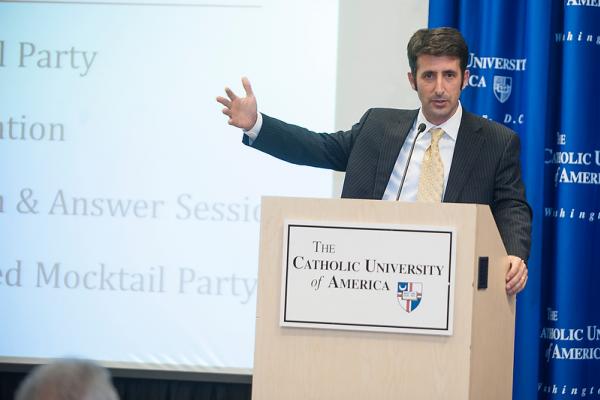In private conversations, Pope Francis often acknowledges that reforming the Vatican will be a difficult task opposed by powerful interests in the church. Developments on Monday showed both the progress he has made and the challenges that remain.
Case in point: Cardinal Raymond Burke, an influential American conservative who has worked in the Roman Curia since 2008, lost one key post on Monday when he was left off the Vatican body that vets bishops for the pope to appoint. Those appointments are seen as the key to securing Francis’ legacy.
But in an interview a few days earlier, Burke — who remains head of the Vatican equivalent of the Supreme Court — also publicly raised doubts about Francis’ plans to make wholesale changes in a papal bureaucracy in keeping with the pontiff’s vision of a more open, pastoral church.
As we prepare for the coming of Christ, the third Sunday of advent is celebrated in joy. As followers of Christ, it is reasonable to be exuberant about the birth of our Savior. The amount of happiness that can seep from the soul in response to a virgin birth, a perfect baby boy, and an adorable scene of livestock and shepherds befriending God’s family is immeasurable. Christmas music, Christmas decorations, and yes, even Christmas presents add to the joy and never fail to put a smile on my face.
This past weekend, as I tried to reflect on what it means to be joyful in Christ, my heart was temporarily hardened as I attended a Reentry Arts & Information Fair for returning citizens. I helped host a table for Becoming Church and their Why We Can’t Wait initiative.
Conservative talk show host Megyn Kelly claimed on her Fox News show last week that “For all you kids watching at home, Santa just is white ... just because it makes you feel uncomfortable doesn’t mean it has to change, you know, I mean, Jesus was a white man, too ... that’s a verifiable fact, I just want kids to know that.”
This statement was in response to a Slate piece by Aisha Harris, “Santa Should Not Be a White Man Anymore,” which notes her confusion between seeing a black Santa figurine in her home while white Santas were popularized elsewhere at the mall and her school. Because the real history of St. Nicholas is so far removed from his present iteration as Santa Claus, she argues that it would be easier and less culturally problematic to change him into a penguin. This avoids questions of race and culture and makes him accessible to all. While I see her point about wanting to avoid cultural problems, it might be a good idea to confront the underlying issue of racism in America rather than continue to ignore it.
It seems like there’s nothing but bad news all around us. Congress can’t get anything done, the Middle East is in turmoil, and climate change is making natural disasters worse around the world. But a couple of weeks ago, I went to an event in Washington, D.C., hosted by the National Campaign to Prevent Teen and Unplanned Pregnancies that celebrated a major accomplishment. The teen birth rate and pregnancy rate are both down — and not just by a little bit.
The teen birth rate has plummeted by 52 percent since 1991, while the teen pregnancy rate has fallen by 42 percent. Fewer teen pregnancies mean fewer abortions, less financial strain on families, and more children being born into families that are ready to have a child.
This news came as a surprise to me, as it did to many. Seventy-four percent of adults incorrectly believe the teen pregnancy rate has increased or stayed the same. Fewer teens have gotten pregnant do to a combination of waiting to have sex until later and being more educated about the proper way to use contraception. This news doesn’t fit the current narrative that millennials and young people don’t take personal responsibility for their lives and choices.
This success is yet another example of what government, the private sector and faith community, and families can accomplish when they work together.
Have you ever given someone a gift knowing that person probably wasn’t going to keep it? You had no idea what to give, so you gave something — a sweater, let’s say, even though you knew the recipient had more than enough sweaters — along with a gift return receipt.
That’s kind of how God gives, isn’t it? No, no, not the sweater part. The part about giving and then letting the others choose what they’ll do with the gifts.
Isn’t that how God gives to us?
And if we’re to be like God, shouldn’t we be giving the same way?
This is a challenging question, but one that’s relevant at this season of giving. Do we give with no strings attached? Or do we give with conditions? Do we give only to those we deem worthy?
The Native American narrative remains largely unknown in U.S. majority culture. It is glaringly absent in most school curriculums, and remains unheard in modern dominant politics. One crucial stream of Native culture I’ve recently come to learn about is the destructive legacy of Christian-run Indian boarding schools.
What began with genuinely good intentions (in those days, “European” norms were viewed as superior, “sameness” seemed like a good idea, and the threat of legitimate genocide lingered over tribes) rapidly deteriorated, with Christian boarding schools becoming institutions of forced assimilation and abuse.
Beginning in the 1800s and lasting into the 20th century, Native children were forcibly removed from their families and sent to live in boarding schools. Finding the task of “civilizing” Native adults beyond its ability, the federal government delegated the task of “normalization” to churches, which could educate, or, inculcate, children from a young age.
Dozens of Catholic leaders are protesting the decision by the Catholic University of America to accept a large donation from the foundation of Charles Koch, a billionaire industrialist who is an influential supporter of libertarian-style policies that critics say run counter to church teaching.
Charles Koch and his brother, David, “fund organizations that advance public policies that directly contradict Catholic teaching on a range of moral issues from economic justice to environmental stewardship,” says a four-page letter to CUA President John Garvey, released Monday.
The letter was signed by 50 priests, social justice advocates, theologians, and other academics, including several faculty at CUA in Washington.






